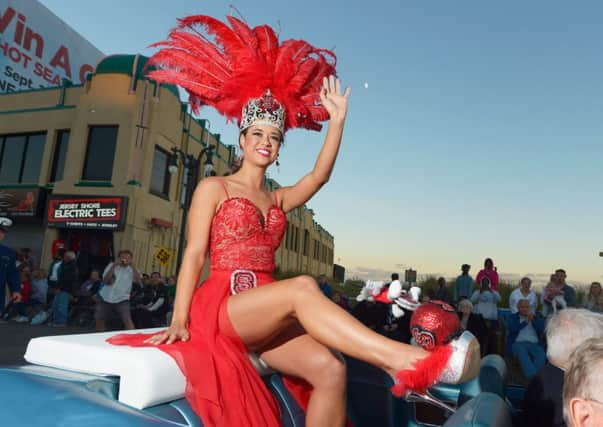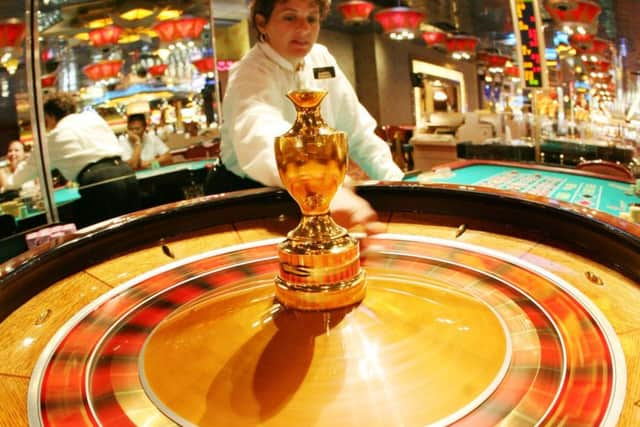Casino’s collapse adds to loss for Atlantic City


At $2.4 billion (£1.5bn), the bold, curved architecture of the Revel Casino brought some glamour to a tired seafront and was designed to bring back the high rollers who have deserted the East Coast’s gambling capital.
However, two years after it was built, the casino stands empty. Last week a blackjack croupier called “last hand” and it became the latest and most high-profile casualty of Atlantic City’s losing streak.
Advertisement
Hide AdAdvertisement
Hide Ad“It breaks my heart to see,” said Mary Williams, from New York, a slot-machine enthusiast who has visited every year for the past two decades.


“Atlantic City was always famous for two things: casinos and the boardwalk. So many casinos have closed and it feels like the place is a ghost town, but I guess we’ll always have the ocean.”
It is a far cry from the 1980s when the boxer Mike Tyson was a regular visitor, or the 1920s when prohibition established Atlantic City as a gambler’s paradise – a period captured in the television drama Boardwalk Empire.
Locals blame the relaxed gambling laws which have allowed competitors to open elsewhere along the Atlantic seaboard – in Maryland, Pennsylvania and Delaware – as well as the growth in internet gaming.
The Showboat, next door to the Revel’s shiny glass exterior, shut two days earlier and Trump Plaza is expected to close this month.
It is a bitter blow to 7,000 workers – dealers, waiters, hotel managers, cleaners and more – who have lost their jobs, and a heavy burden on a town with a permanent population of only 40,000.
Marco Negron said his family was typical of those who have suffered.
He had worked at the Revel since it opened and his wife had been at the Showboat until it closed.
Advertisement
Hide AdAdvertisement
Hide AdNow they will have to work out how to support their three children and keep up mortgage payments.
“There will be many more like us,” he said, as he left a union help centre where he had signed up for unemployment benefit and help with health insurance.
“There will be families who are going to lose their homes.
“We have lost so many friends already who have had to move away looking for work.”
It means the city will end the year with eight casinos – a drop of one third.
Rumours slosh around the bars about which will be next to stop taking bets.
It means the famous boardwalk is edged with “for rent” signs. Restaurant tables are empty and the men who push tourists in rolling chairs squabble for business.
Dawid Wronikowski, who has trundled visitors up and down the boardwalk for the past five years, said the great days of the 1920s were long gone.
“It used to be called ‘the playground of the world’,” he said with a shake of his head.
Advertisement
Hide AdAdvertisement
Hide AdGambling has a colourful history in Atlantic City, which developed as a resort town along the railway line from New York.
It took off, ironically, after the United States imposed prohibition in 1919.
Nucky Johnson, a bootlegger who controlled the city’s political machinery, ensured the liquor kept flowing. Punters played card games and dice in dozens of backrooms – even though gambling also remained illegal throughout New Jersey – as the resort converted its seasonal seaside economy into a year-round party.
Those are the years shown in Boardwalk Empire, starring Steve Buscemi as Nucky Thompson, a fictionalised version of Johnson.
When the board game Monopoly was invented in the early 1930s it seemed only natural that its first set was based in the streets of Atlantic City’s boom town.
The post-war years sent the city into a decades-long slump, however. The motorcar turned families into day trippers. Rather than arriving by train and staying for a week, they would only visit for a day.
Things changed again in 1976 when New Jersey voters agreed to allow casinos in Atlantic City in an effort to revitalise a stagnating economy.
High-rise hotels shot up. At the time, it was the only place in the eastern United States to permit gambling, and it soon rivalled Las Vegas as the casino capital of the US.
Advertisement
Hide AdAdvertisement
Hide AdIts reputation was sealed when Donald Trump, the billionaire business magnate, pumped money into the city and promoted big-name boxing bouts. Several of Tyson’s world title fights were fought there in the 1980s. The Rolling Stones were among the big-name acts to perform in the city.
The casinos still rake in big sums. But their heyday, generating $5.2bn (£3.2bn) a year, is almost a decade past.
The gaming rooms stand empty for much of the day, catering only to busloads of pensioners.
Donald Trump has begun proceedings to remove his name from casinos that still trade on an association with his businesses – an association that ended in bankruptcy five years ago – so angered is he by what he sees as declining standards.
“A lot of people say that when I left that’s when it went bad. And in one way I’m honoured by that statement, but in another I feel badly about Atlantic City,” he said in a recent interview with Bloomberg TV.
Many visitors complain there is little more to today’s boardwalk than overpriced casino restaurants.
The big chains have driven up prices and put a premium on parking. Smaller bars and hotels are being squeezed.
Ben Begleiter, spokesman for Unite Here, the union which represents many of the workers, said the city still attracted more than 26 million people a year – visitors who would provide a route out of trouble.
Advertisement
Hide AdAdvertisement
Hide Ad“Atlantic City is a town that re-invents itself time and time again,” he said.
The answer, according to local officials, is to diversify.
The model is Las Vegas, where high-end restaurants and other attractions have reduced its main drag’s dependence on gambling to 36 per cent of total revenue, half the figure of Atlantic City.
Next Sunday, Miss America will be crowned in Atlantic City.
It is a last chance for shopkeepers, hoteliers and rolling chair pushers to make some money before winter.
And it is a coup for the town, which won the beauty contest back from Las Vegas last year, and perhaps a model for the events that might fill hotel rooms.
It was launched at a glittering ceremony, tinged with sadness at the casino closures despite the best efforts of Kim Guadagno, a state official, who did her best to inject some optimism.
“That is not the beginning of the end, believe me,” she said.